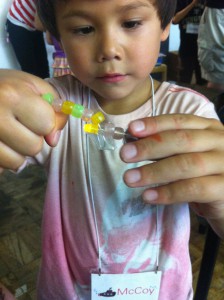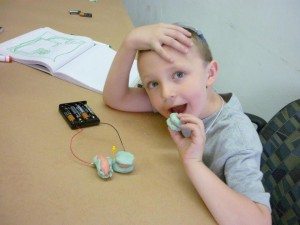By Maddie Adamczyk (Senior, Hampton High School)
and Sarah Parker (Junior, Pittsburgh Obama 6-12)

Benjiro learns about monomers and polymers through hands-on play with beads at Mini Mad Scientists Camp.
Assemble bills itself as “a community space for arts and technology” and is housed at 5125 Penn Avenue in Pittsburgh’s Garfield neighborhood. For Summer 2013, they have developed a series of week-long Mini Mad Scientists Camps that include programs for 5-to-7 year olds (the week of July 8th), 8-10 year olds (the week of July 15th) and 11-to-13 year olds (the week of July 22nd). The last of these camps is still accepting applicants as of this writing.Camps have daily themes that embrace hands-on learning. Jess, a youth educator and outreach coordinator, noted that one of the main goals of each camp is to “engage kids with media.” This goal is met with daily do-it-yourself activities and demos they have planned for the campers.
We visited the camp for 5-to-7 year olds on Monday, July 8th and watched educators as they talked about ecology and gave the campers a chance to make their own terrariums. Campers also were taught how to extract DNA from spinach and how to make DNA models out of marshmallows and Twizzlers. Tuesday was dedicated to a “fun, interactive lesson.” Wednesday, the campers were led in making simple circuits. The educators pre-made conductive and insulating play dough for the activity which got the kids really involved and excited. On Thursday, campers explored the physics of sound and music. They watched a video describing the ear and its functions and played with demos as they learned the difference between sound and pitch. The kids were later recorded saying their names and then traced their sound waves on the projector screen. The counselors used Audacity (audio editing freeware) to record and play these and other sounds.
The children involved with the camp were also a part of a Carnegie Mellon University study focused on how children learn and interact with science and scientific projects. For privacy — and as an extra opportunity to learn — participating students were identified by replacing their real names with names of famous scientists such as Watson and Faraday.

Jack plays with simple circuits, made out of conductive and insulating play dough and LED lights on electricity day of Mini Mad Scientists Camp.
Mini Mad Scientist Camps are one of many programs geared to children and teens at Assemble. Additional information is available at www.assemblepgh.org.
Leave a Comment